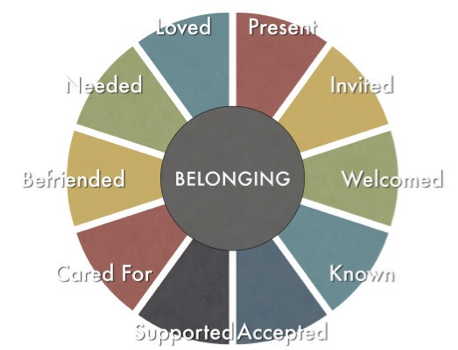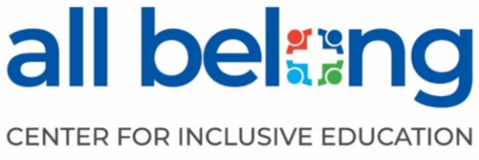What does it mean to belong? Recently, Dr. Erik Carter at Vanderbilt University sought to answer this question for persons with disabilities in church communities. Dr. Carter and his associates asked hundreds of individuals with disabilities and their families across the country to identify the aspects that would make them feel like full members of community.
 Through this research, Dr. Carter identified 10 dimensions of belonging: present, invited, welcomed, known, accepted, supported, cared for, befriended, needed, and loved. The 10 dimensions of belonging are such a beautiful picture of 1 Corinthians 12:27 (NIV): “Now you are the body of Christ, and each one of you is a part of it.”
Through this research, Dr. Carter identified 10 dimensions of belonging: present, invited, welcomed, known, accepted, supported, cared for, befriended, needed, and loved. The 10 dimensions of belonging are such a beautiful picture of 1 Corinthians 12:27 (NIV): “Now you are the body of Christ, and each one of you is a part of it.”
I love that we can apply these dimensions to more than just church—to Christian schools, churches, and our entire community. This pursuit of belonging, and providing it for each other, is richly integrated into our faith, the gospel message, and our Christian schools, especially when we pursue inclusive education for students of all abilities.
Model of Belonging
Unpacking this model of belonging can provide important guidance for understanding where our communities are succeeding, and where we are still working toward that vision:
Present—How often do we look around our schools and wonder about those who aren’t present? It is estimated that 20-25% of today’s population has a disability of some kind. On the most basic level, how does your school compare?
Invited—Have you ever attended a private event you weren’t invited to? A personal invitation makes such a difference, and yet we often expect families with disabilities to make the first move. Are there siblings, cousins, or employees we can seek out to add a richness of varied experiences to our community? Who are we missing out on?
Welcomed—Carter suggests you don’t need to be a disability expert to be welcoming; you can say hello, notice each other, and find common ground. Sometimes this may also involve gaining new understandings of disabilities, but also learning and teaching our students to recognize the shared humanity of every person we meet.
Known—Being known to your friends and your teachers is different than being known about. It can be tempting to label students by their achievements or even their deficits, but how are we getting to know all the facets and passions of our students?
Accepted—Acceptance follows being known, and accepting others means embracing each person for their uniqueness. Rather than asking students with sensory differences, for example, to react differently, how can we change the environment to adapt to their experiences of it?
Supported—Well-designed questions can lead us into community with one another, but we must practice deep listening as we seek to understand the support that students need and operate from a belief in belonging. In special education practice, we must invest in the appropriate supports and bridges for students with disabilities to the general education curriculum.
Cared for—Based on the good questions mentioned above, are we responding to spiritual, practical, and emotional needs in ways that are meaningful to our students, particularly those with disabilities? Recent Cardus research shows that parents of students in independent schools most value a “supportive, nurturing environment.” Student with disabilities are no different in this aspect.
Befriended—This is such an important skill to teach in our Christian schools, but we cannot assume that students have all the information they need to develop friendships naturally. For students with disabilities and their age-appropriate peers, are we taking the time to teach social skills?
Needed (valued)—For students and their families who feel invisible or who have experienced rejection due to their disability, this is an extremely powerful aspect. The picture of community painted in 1 Corinthians 12 shows us that our schools need the gifts brought by students with disabilities; inclusion impacts everyone in the community. When was the last time we celebrated the gifts of a student who might also challenge us?
Loved—Much more than simply being nice, loving one another is our most radical act as Christians. For persons with disabilities who have historically been excluded and may often feel like “outsiders,” it is a testimony of belonging together in Christ.
Communities of Belonging
 The calling to work faithfully to create communities of belonging for persons of all abilities is what drives our work in Christ-centered schools and churches across North America. I was particularly blessed to hear Dr. Carter’s presentation shortly after our board of directors voted to adopt our organization’s new name, All Belong Center for Inclusive Education.
The calling to work faithfully to create communities of belonging for persons of all abilities is what drives our work in Christ-centered schools and churches across North America. I was particularly blessed to hear Dr. Carter’s presentation shortly after our board of directors voted to adopt our organization’s new name, All Belong Center for Inclusive Education.
Formerly known as CLC Network, All Belong is the leading catalyst for creating and maintaining inclusive communities for persons of all abilities. This new name clearly articulates the heart of our 40-year mission—that persons of all abilities belong within community. Our new logo conveys our beliefs about community: each person gathered together in interdependence, all pointed toward Christ. This change is emblematic of a commitment to faithfully building belonging for persons of all abilities. It is an honor to pursue that commitment alongside such a faithful, Christ-centered community.
[Author’s Note: Images used with permission.]
Additional Resources
Check out a podcast with Elizabeth Dombrowski on creating inclusive communities in Christian schools, as well as two blog posts with practical ideas for inclusion in Christian schools: Belonging and Disability in the Christian School and Inclusive Education: One Christian School’s Journey.
About the Author
 Elizabeth Lucas Dombrowski is the executive director of All Belong Center for Inclusive Education, equipping congregations and schools to glorify God through purposeful, innovative inclusion of persons of varied abilities. All Belong partners with Christ-centered schools across the country to support their students and welcomes conversations and questions about inclusion of students of all abilities. Elizabeth can be reached at edombrowski@allbelong.org.
Elizabeth Lucas Dombrowski is the executive director of All Belong Center for Inclusive Education, equipping congregations and schools to glorify God through purposeful, innovative inclusion of persons of varied abilities. All Belong partners with Christ-centered schools across the country to support their students and welcomes conversations and questions about inclusion of students of all abilities. Elizabeth can be reached at edombrowski@allbelong.org.

